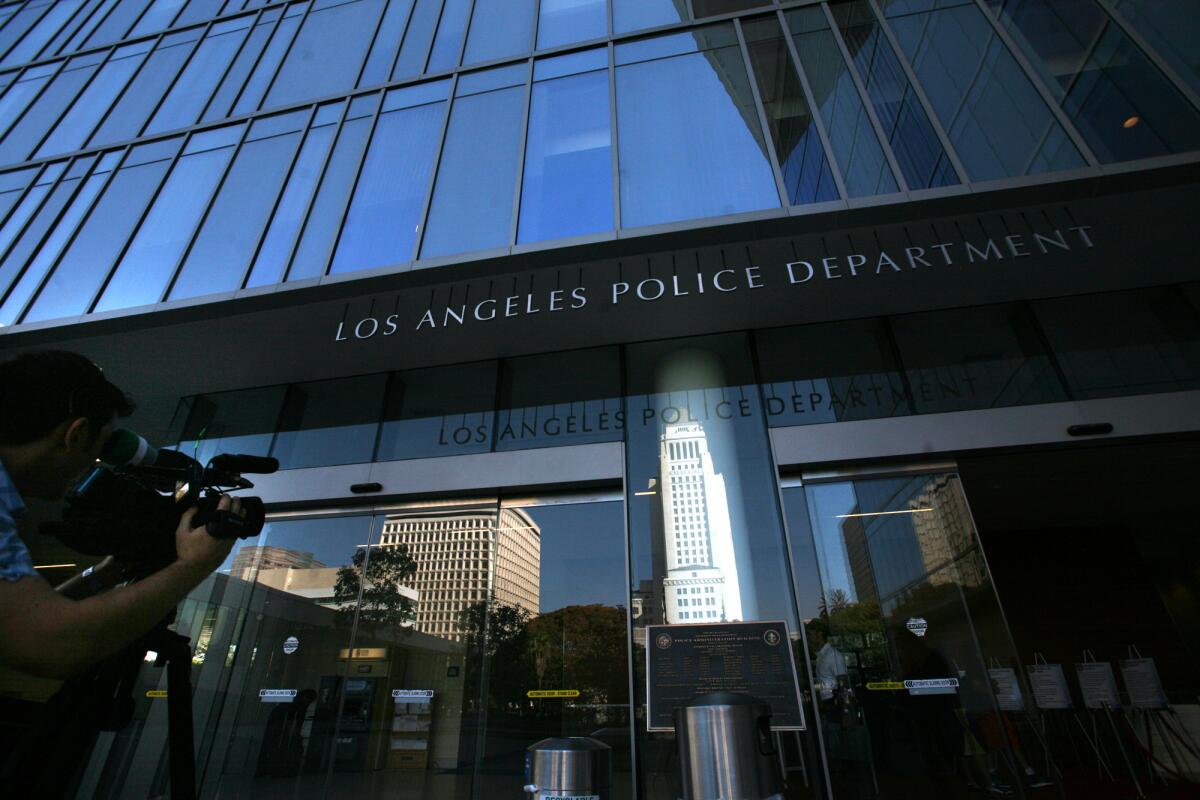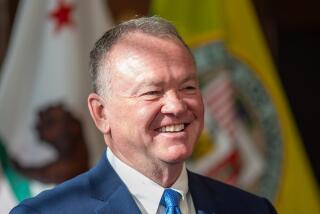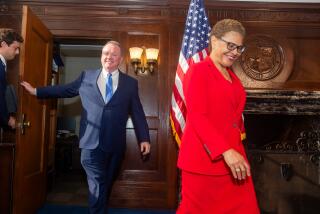Garcetti nominates attorney to Police Commission as Goldsmith steps down

- Share via
Los Angeles Mayor Eric Garcetti has nominated attorney William Briggs to replace nonprofit executive Shane Murphy Goldsmith on the city’s five-member Police Commission, his office said Tuesday.
Goldsmith, who has been on the civilian oversight commission since 2016 and serves as its vice president, is stepping down, Garcetti’s office said. A reason was not given, and Goldsmith could not immediately be reached for comment.
Briggs, a partner at Venable LLP, has worked as a trial lawyer and litigator and has “broad experience in the entertainment industry and ample time spent in state and federal courtrooms across various practices of law,” according to Garcetti’s office. His appointment is subject to approval by the City Council.
If confirmed, Briggs would be the second newcomer to the Police Commission in recent months. Youth advocate Lou Calanche joined the board in August after Commissioner Sandra Figueroa-Villa stepped down amid illness.
In a statement, Garcetti said Briggs “will bring an extraordinary record of leadership and commitment to the fight for fairness, equity, and a safer Los Angeles.”
“Nothing matters more to our common security than deepening bonds of trust between police officers and the Angelenos they serve, especially in communities of color, and I know William shares my commitment to working with Angelenos to bring meaningful change,” Garcetti said.
Briggs, 65, is a native of L.A., from the Crenshaw area. He has previously served as a commissioner on the Los Angeles City Employees Retirement Service, where he helped oversee administration of the city employees’ pension benefits.
In a telephone interview Tuesday, Briggs said he was eager to get started.
“I just look forward to getting in there, digging in and studying the issues and hopefully coming up with some good solutions,” he said.
Briggs said his desire to join the commission at such a critical time for policing came after he attended protests this summer with his college-age daughter for George Floyd and Breonna Taylor, two Black people whose deaths at the hands of police in Minneapolis and Louisville sparked protests nationwide.
“That kind of crystalized to me that changes to the Police Department are still needed, and when I was presented with the opportunity to join the [Commission], I didn’t flinch. I said ‘absolutely,’” Briggs said. “Reform is needed in terms of more community policing, more recognition of the racial injustice that may be the result of just some of the innate bias that people have and they carry with them.”
Briggs said he has family members in the LAPD, knows “the challenges that they face,” and wants them all to go home safely at night.
“But by the same token, I know that as a black man we are often treated differently,” he said, “so I want to see whether or not that can be changed — and I’m hoping to be a voice for some of that positive change.”
The Police Commission oversees the LAPD, helping to set policy and review incidents such as police shootings. Its members generally meet weekly — by Zoom amid the COVID-19 pandemic — and discuss crime trends and policy issues with LAPD Chief Michel Moore and other commanders, whom the commissioners technically outrank.
Under the intense spotlight on police this year, the commission also has been heavily scrutinized — for decisions it has made on police shootings, a perceived lack of teeth to its oversight of the department in the eyes of activists, and its recent decision to limit public comment at its weekly Zoom meetings to 45 minutes.
The union that represents rank-and-file LAPD officers also has criticized the commission. On Tuesday, the Los Angeles Police Protective League’s board blasted the commission for discussing racial bias in police stops at their weekly meeting instead of the 25% increase in homicides in the city — accusing the commission of having “no plan” to reduce the violence.
“Police Commissioners, where is your plan to keep L.A. safe?” the union asked.
Goldsmith and other commission members have also been individually criticized for making decisions that dictate how the LAPD interacts with community organizations while maintaining their own ties to such organizations. The commissioners have all said they follow all ethics guidelines.
Goldsmith is president and chief executive officer of the Liberty Hill Foundation, which provides funding and training to community organizations. She previously served as a senior advisor to Garcetti when Garcetti served on the City Council.
More to Read
Sign up for Essential California
The most important California stories and recommendations in your inbox every morning.
You may occasionally receive promotional content from the Los Angeles Times.











